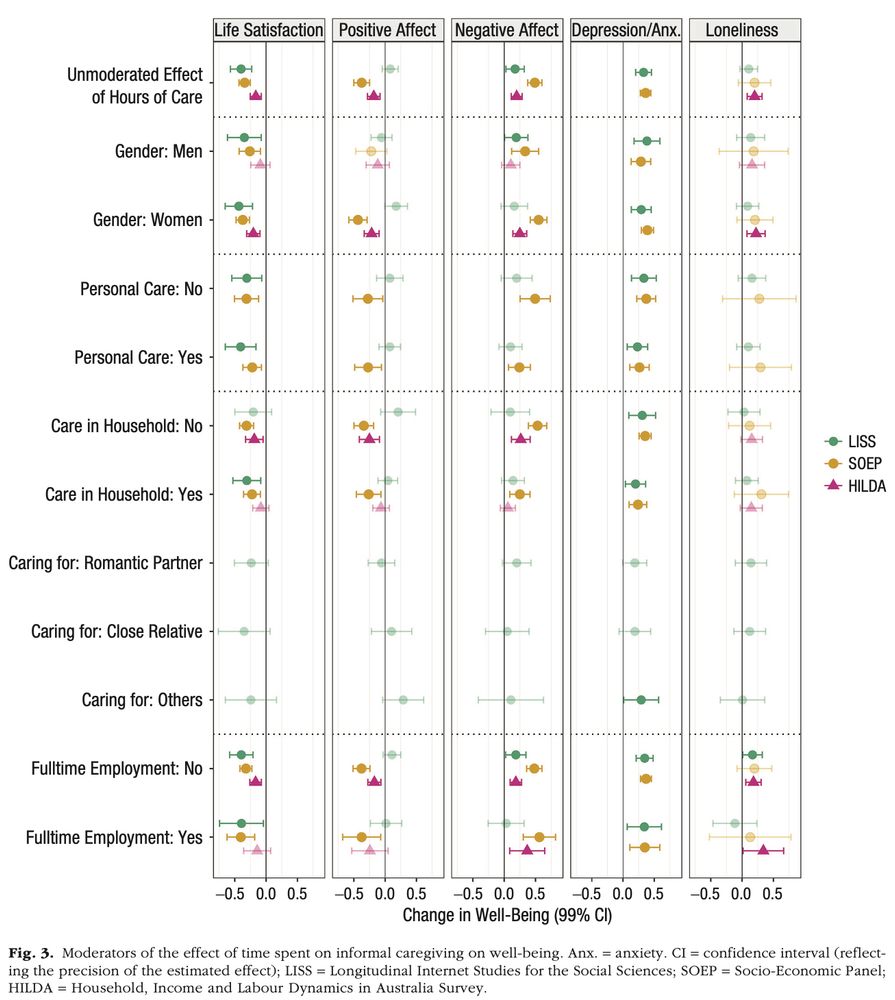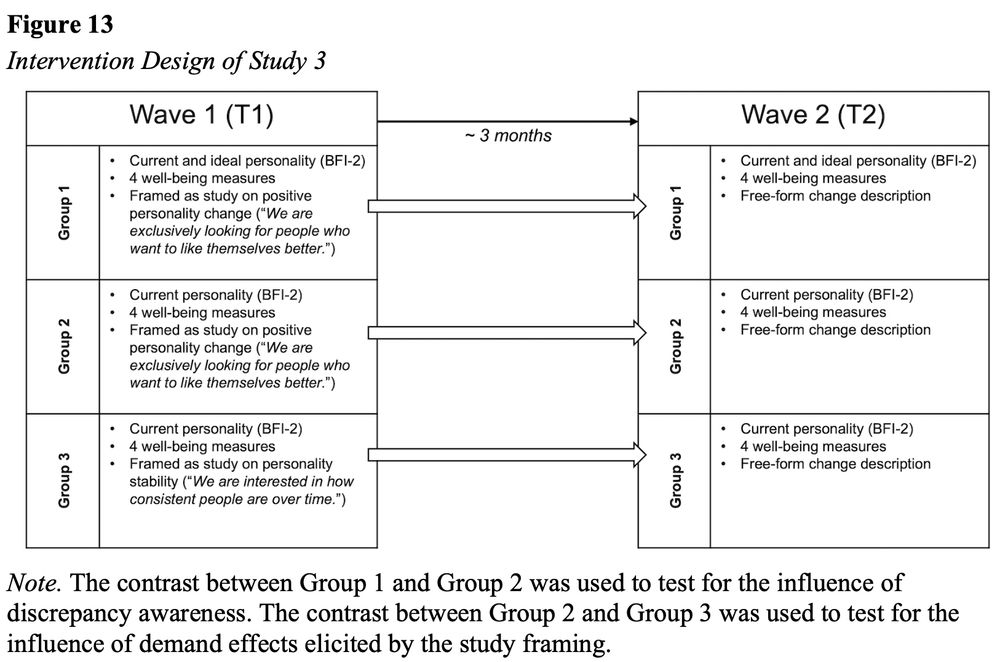
Michael D. Krämer
@mdkraemer.bsky.social
Postdoc at UZH | PhD in psychology from FU-Berlin | research interests in personality psych, well-being, and social relationships
Lastly, we examined gender, care tasks, the relationship with the care recipient, and full-time employment as moderators of these effects of additional time investment. Effects were consistent across these moderators of the caregiving context.

November 25, 2024 at 5:32 PM
Lastly, we examined gender, care tasks, the relationship with the care recipient, and full-time employment as moderators of these effects of additional time investment. Effects were consistent across these moderators of the caregiving context.
In models of the intensity of care provision, we found that informal caregivers further declined in well-being when they spent more time on caregiving (across almost all models).

November 25, 2024 at 5:32 PM
In models of the intensity of care provision, we found that informal caregivers further declined in well-being when they spent more time on caregiving (across almost all models).
In temporal models of within-person change, we found that life satisfaction, affective experiences, depression/anxiety, and loneliness decreased relatively consistently when people became informal caregivers. These decreases were often more pronounced and longer-lasting for women.

November 25, 2024 at 5:32 PM
In temporal models of within-person change, we found that life satisfaction, affective experiences, depression/anxiety, and loneliness decreased relatively consistently when people became informal caregivers. These decreases were often more pronounced and longer-lasting for women.
Already excited for the @dgps.bsky.social congress next week in Vienna? 🇦🇹 If you're around on Wed. 9:30, we'd love to see you in our symposium on social drivers of personality change w/ Manon van Scheppingen, Larissa Wieczorek, Eva Bleckmann, & @rosalieandrae.bsky.social (who created this graphic😊)

September 12, 2024 at 4:12 PM
Already excited for the @dgps.bsky.social congress next week in Vienna? 🇦🇹 If you're around on Wed. 9:30, we'd love to see you in our symposium on social drivers of personality change w/ Manon van Scheppingen, Larissa Wieczorek, Eva Bleckmann, & @rosalieandrae.bsky.social (who created this graphic😊)
checks, we randomly shuffled group membership and estimated very similar effects -- same when we reversed the ordering of time. We discuss theoretical and methodological implications for studying personality development though social relationships: osf.io/rd8ms (4/4)

September 9, 2024 at 8:21 PM
checks, we randomly shuffled group membership and estimated very similar effects -- same when we reversed the ordering of time. We discuss theoretical and methodological implications for studying personality development though social relationships: osf.io/rd8ms (4/4)
of 3 to 6 fellow students who were strangers initially but met several times over the course of the semester. At first glance, we found evidence for small but significant assimilation effects of personality, that is, an individual becoming more like the remaining group (2/4)

September 9, 2024 at 8:20 PM
of 3 to 6 fellow students who were strangers initially but met several times over the course of the semester. At first glance, we found evidence for small but significant assimilation effects of personality, that is, an individual becoming more like the remaining group (2/4)
Still friends with people you randomly met in a university study group? 👯🧑🎓 In this preprint with André Kretzschmar,
@chopwood.bsky.social, and
@wiebkeb.bsky.social, we looked at social influences on personality change in a design that randomized first-semester students to peer groups (1/4)
@chopwood.bsky.social, and
@wiebkeb.bsky.social, we looked at social influences on personality change in a design that randomized first-semester students to peer groups (1/4)

September 9, 2024 at 8:20 PM
Still friends with people you randomly met in a university study group? 👯🧑🎓 In this preprint with André Kretzschmar,
@chopwood.bsky.social, and
@wiebkeb.bsky.social, we looked at social influences on personality change in a design that randomized first-semester students to peer groups (1/4)
@chopwood.bsky.social, and
@wiebkeb.bsky.social, we looked at social influences on personality change in a design that randomized first-semester students to peer groups (1/4)
third study that compared three different specifications of a control group. This comparison revealed that expectancy and demand effects elicited by the framing of the study as an intervention explained changes in three of the Big Five traits (E,C,N) as well as life (5/7)

September 5, 2024 at 7:14 PM
third study that compared three different specifications of a control group. This comparison revealed that expectancy and demand effects elicited by the framing of the study as an intervention explained changes in three of the Big Five traits (E,C,N) as well as life (5/7)
also increased in current personality ratings and well-being indicators over the 3-month period before the intervention. Effect sizes were only slightly smaller or comparable to the intervention groups. To show why this change in the control group occurred, we conducted a (4/7)

September 5, 2024 at 7:13 PM
also increased in current personality ratings and well-being indicators over the 3-month period before the intervention. Effect sizes were only slightly smaller or comparable to the intervention groups. To show why this change in the control group occurred, we conducted a (4/7)
by tempering ideal personality ratings. Unexpectedly, we found across two studies that both intervention programs improved current personality ratings and well-being similarly, while ideal personality remained stable. Even more striking, in Study 2, a waitlist control group (3/7)

September 5, 2024 at 7:13 PM
by tempering ideal personality ratings. Unexpectedly, we found across two studies that both intervention programs improved current personality ratings and well-being similarly, while ideal personality remained stable. Even more striking, in Study 2, a waitlist control group (3/7)
their effects on personality (current / ideal) and well-being aspects. We assumed that both programs would decrease the discrepancy between current and ideal personality; the self-improvement intervention by boosting current personality and the self-acceptance intervention (2/7)

September 5, 2024 at 7:12 PM
their effects on personality (current / ideal) and well-being aspects. We assumed that both programs would decrease the discrepancy between current and ideal personality; the self-improvement intervention by boosting current personality and the self-acceptance intervention (2/7)
the control strategy. In addition, patterns of bias were often consistent with the frequency and types of event co-occurrence. For other event types (e.g., unemployment, bereavement), confounding through co-occurring events was negligible. Based on this paper, our recommendation is to consider...

February 12, 2024 at 6:00 PM
the control strategy. In addition, patterns of bias were often consistent with the frequency and types of event co-occurrence. For other event types (e.g., unemployment, bereavement), confounding through co-occurring events was negligible. Based on this paper, our recommendation is to consider...
undercontrol (i.e., confounding through other events that we should control for) and overcontrol bias are (i.e., confounding introduced through inappropriate controls). For events related to romantic relationships or childbirth we found consistent evidence for these two types of bias depending on...

February 12, 2024 at 5:59 PM
undercontrol (i.e., confounding through other events that we should control for) and overcontrol bias are (i.e., confounding introduced through inappropriate controls). For events related to romantic relationships or childbirth we found consistent evidence for these two types of bias depending on...

